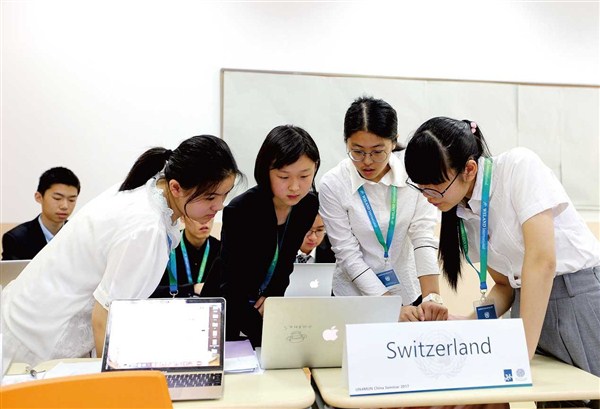
Shanghai Today
A remodeled United Nations getting things done - July 07, 2017
模拟联合国大会深受本土学生喜爱

MODEL United Nations (MUN) conferences have been popular in China for years, a new approach of the UN model came to China and Shanghai for the first time recently, which adopts authentic UN conference procedure, and turned out to be welcomed both by schools and students.
With UN4MUN initiated by the UN Department of Public Information in 2013, the three-day UN4MUN China Seminar was held at the end of May at Shanghai High School International Division by the Weland International, an MUN education company in China.
Students from 16 high schools across China attended the novel activity with topics of climate change, gender equality and anti-terrorism.
It was first trialed in a small scale at WEMUN Expo in Beijing last year by Weland and officially launched in Shanghai this year as MUN has long been questioned for being far away from the real current UN over 60 years after the simulation was first started.
One big difference between MUN and real UN lies in rules of procedure.
As nearly all MUN conferences adopt the parliamentary procedure, involving debates and voting, the real General Assembly or other UN bodies actually avoid voting. Almost 80 percent of the over 300 resolutions were adopted by GA without voting each year, according to William Yotive, former UN DPI Outreach Division Project manager and creator of UN4MUN.
Instead, delegates identify differences between drafted resolutions and compromise to achieve consensus during informal meetings. When it comes to the conference for them to “take action” on the resolution, it is usually adopted by consensus.
So in the UN4MUN seminar, students no longer have to ally with others to seek signatories and defeat the rest to win the game as participants of traditional MUN events do.
Ma Feng, principal of SHSID High School, welcomed the new MUN approach as it placed a greater focus on cooperation, diplomacy and consensus-building and encouraged the development of a diverse skill-set and global perspective among the participants.
“Other MUN conferences are more about competing and winning with their own resolutions, while this one requires all students in one committee to discuss about one resolution and contribute their ideas,” he said. “They have to learn a different way of thinking and communicating, and even have to compromise.”
Emily Teng, the president of General Assembly of the first UN4MUN China Seminar and a student of the Shanghai High School International Division, also said that when focusing on winning, participants sometimes failed to understand the global issues thoroughly as they rejected other people’s opinions.
Zhu Yesheng, an experienced MUN participant from Suzhou International Academy Affiliated to Beijing Foreign Studies University, said the new model enabled participants to work out better solutions.
“In previous activities, we spent most time on finding allies to form political blocs and the result was that we had little time to carry thorough discussion and work out an impeccable resolution,” he said.
“I found this conference more interesting as everyone contributed his or her ideas to work out a consensus throughout the process. The final resolution is much more satisfying.”
With UN4MUN initiated by the UN Department of Public Information in 2013, the three-day UN4MUN China Seminar was held at the end of May at Shanghai High School International Division by the Weland International, an MUN education company in China.
Students from 16 high schools across China attended the novel activity with topics of climate change, gender equality and anti-terrorism.
It was first trialed in a small scale at WEMUN Expo in Beijing last year by Weland and officially launched in Shanghai this year as MUN has long been questioned for being far away from the real current UN over 60 years after the simulation was first started.
One big difference between MUN and real UN lies in rules of procedure.
As nearly all MUN conferences adopt the parliamentary procedure, involving debates and voting, the real General Assembly or other UN bodies actually avoid voting. Almost 80 percent of the over 300 resolutions were adopted by GA without voting each year, according to William Yotive, former UN DPI Outreach Division Project manager and creator of UN4MUN.
Instead, delegates identify differences between drafted resolutions and compromise to achieve consensus during informal meetings. When it comes to the conference for them to “take action” on the resolution, it is usually adopted by consensus.
So in the UN4MUN seminar, students no longer have to ally with others to seek signatories and defeat the rest to win the game as participants of traditional MUN events do.
Ma Feng, principal of SHSID High School, welcomed the new MUN approach as it placed a greater focus on cooperation, diplomacy and consensus-building and encouraged the development of a diverse skill-set and global perspective among the participants.
“Other MUN conferences are more about competing and winning with their own resolutions, while this one requires all students in one committee to discuss about one resolution and contribute their ideas,” he said. “They have to learn a different way of thinking and communicating, and even have to compromise.”
Emily Teng, the president of General Assembly of the first UN4MUN China Seminar and a student of the Shanghai High School International Division, also said that when focusing on winning, participants sometimes failed to understand the global issues thoroughly as they rejected other people’s opinions.
Zhu Yesheng, an experienced MUN participant from Suzhou International Academy Affiliated to Beijing Foreign Studies University, said the new model enabled participants to work out better solutions.
“In previous activities, we spent most time on finding allies to form political blocs and the result was that we had little time to carry thorough discussion and work out an impeccable resolution,” he said.
“I found this conference more interesting as everyone contributed his or her ideas to work out a consensus throughout the process. The final resolution is much more satisfying.”


